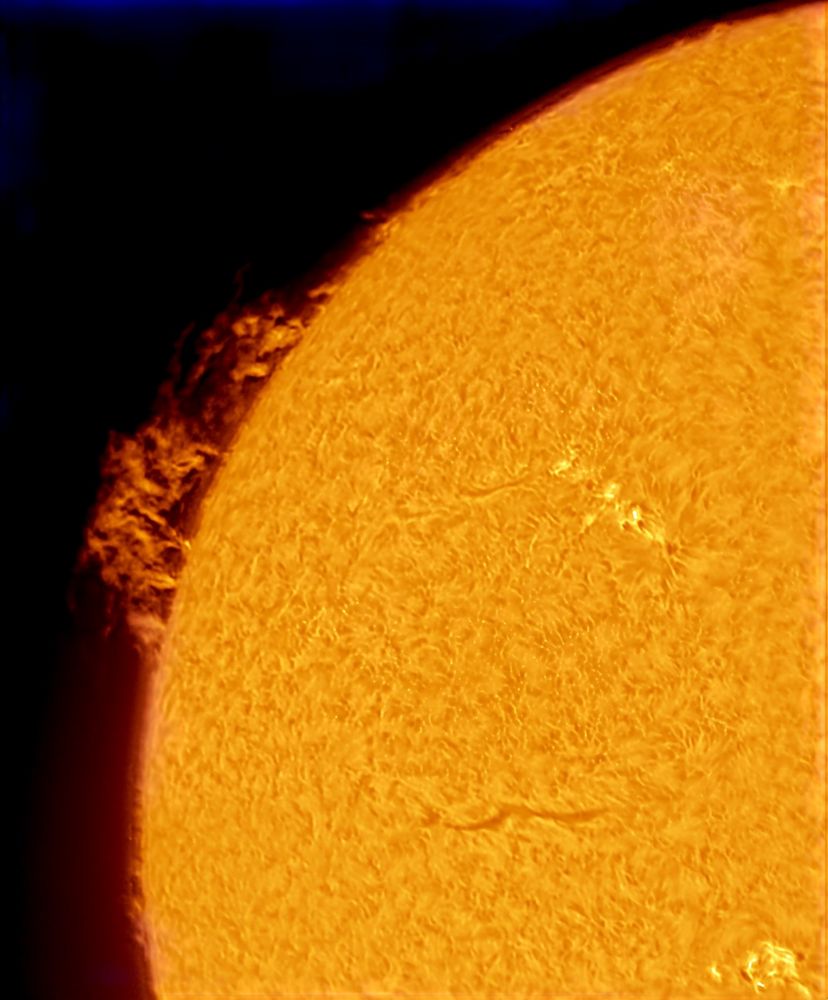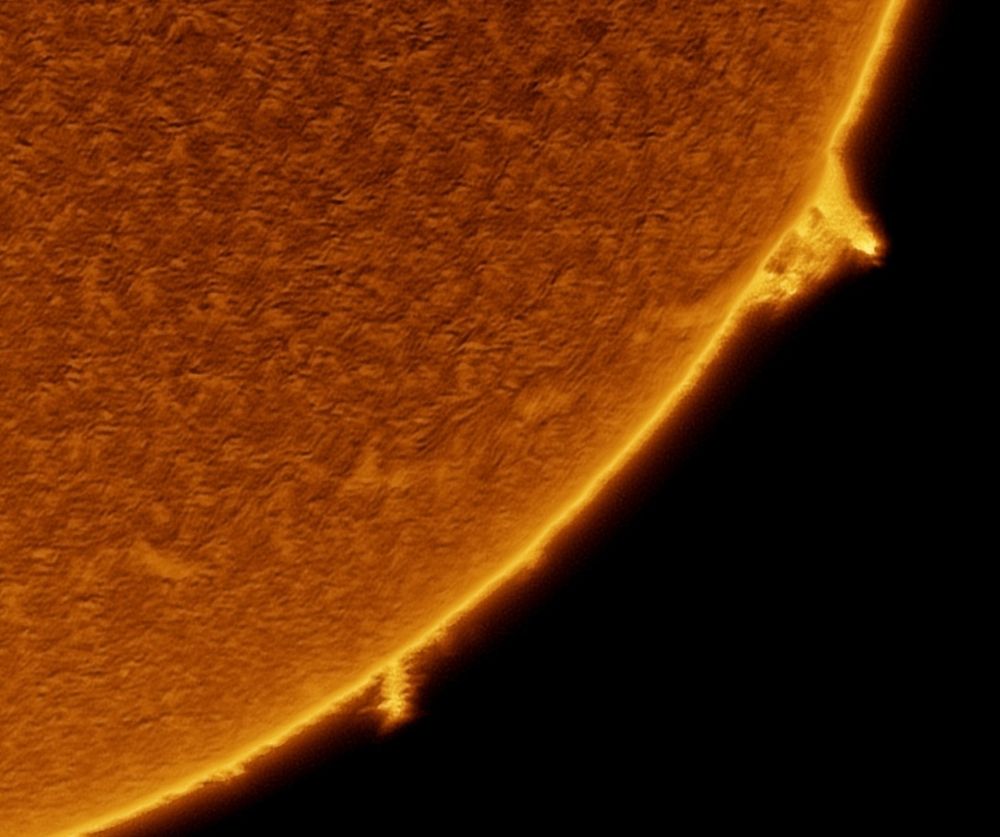
A black cat staring into space
Felix Astronomicus - also known as Finn - wondering what the problem was.
12.10.2025 08:51 — 👍 1 🔁 0 💬 1 📌 0@mikechristie.bsky.social
Interested in maths, physics, astronomy, astrophotography. Member of Astronomical Society of Edinburgh. Emeritus Professor at Heriot-Watt University.

A black cat staring into space
Felix Astronomicus - also known as Finn - wondering what the problem was.
12.10.2025 08:51 — 👍 1 🔁 0 💬 1 📌 0
Close up of the Moon showing the Apennine mountains, with Hadley Rille. The three major craters near the Apennines are Archimedes with lava filled floor, Autolycus and Aristillus. Following the sweep of the mountains you come to Cassini with A and B craters clearly seen. Then the Alpine Valley and Plato.
Woken early by Felix Astronomicus and saw the sky was clear, so got a quick shot of the Moon. CFF135 🔭, #TeleVue 2.5x powermate, #Touptek 585 mono. Pleased that I got most of Hadley Rille. Best 100 frames from 1000 frame video. #astrophotography
12.10.2025 08:49 — 👍 4 🔁 1 💬 1 📌 0The answer has to be "mebbes aye and mebbes naw" 😅
11.10.2025 14:40 — 👍 2 🔁 0 💬 0 📌 0
Large prominence on NW limb of the Sun.
Large prominence on NW limb of the Sun captured at 15:20 today (11 October) with Coronado SolarMax 🔭 and #TeleVue 2.5x Powermate. #Touptek 585 mono camera. Stacked in AstroSurface, then processed and coloured in PixInsight. #heliophysics #astrophotography
11.10.2025 14:37 — 👍 40 🔁 4 💬 0 📌 3Thanks Tim
10.10.2025 12:13 — 👍 0 🔁 0 💬 0 📌 0
The Helix Nebula (NGC7293) is a planetary nebula in Aquarius. It is one of the closest planetary nebula to us and was formed by an intermediate to low mass star shedding its outer layers at the end of its life. The red colours are hydrogen-alpha, the yellowy clouds indicate some silicon2, and the blue colours are oxygen3
NGC7293 (Helix Nebula) imaged in HSO earlier this month with @astronomyedinburgh.bsky.social remote Murrell 12" Newtonian 🔭 at #Trevinca in Spain. 71 x 300s Ha, 96 x 300s Oiii, 171 x 300s Sii. Processed in PixInsight. #astrophotography
10.10.2025 07:58 — 👍 64 🔁 7 💬 2 📌 0Looks great fun!
08.10.2025 15:04 — 👍 1 🔁 0 💬 0 📌 0I had a potential PhD student apply and promise to be the best student I'd ever had at <other university name> 😀. I didn't reply...
08.10.2025 06:37 — 👍 0 🔁 0 💬 0 📌 0
M33 the Triangulum galaxy. This was taken with a mono camera using luminance, red, green and blue filters which were combined in post processing. Even without H-alpha, the red Ha regions are visible along with young blue star regions and dust lanes near the centre of the galaxy.
My previous M33 combined colour RGB data from last year with L data from my new Touptek because I had not got good flats for the G and B channels. I fixed that this evening and processed 85 x 60s L, 20 x 60s G, B, and 19 x 60s R to get this image. CFF135 🔭, #Touptek ATR2600M. #astrophotography
28.09.2025 21:54 — 👍 45 🔁 4 💬 0 📌 0It was the price for the complete mono set. I have a QHY286C for colour, and @astronomyedinburgh.bsky.social has a Touptek clone in our remote observatory which produces great images. I paid just under £2250 for the complete set delivered. I put up a recent mono shot of M33 as the first image.
28.09.2025 14:42 — 👍 2 🔁 0 💬 1 📌 0Hope Christmas comes early for you 😀
28.09.2025 12:53 — 👍 2 🔁 0 💬 1 📌 0I just bought the Touptek ATR2600M with the 7 x 2" filter wheel, LRGBSHO 2" filters, OAG and tilter. I bought the ATR2600 direct from Touptek with the 5% discount and the price you see is the price delivered to your door - they cover import duties, shipping and VAT. I'm happy with it so far.
28.09.2025 12:49 — 👍 2 🔁 0 💬 2 📌 0
Catherine having a laugh at the Aberdeen science centre with three girls playing with a powerful fan.

Catherine chatting to an interested girl in front of an arch they've just built.

Catherine and two kids looking earnestly at some marshmallows in a glass jar that is about to become a vacuum.

Catherine looking through a giant lens. She has a mask on.
The fantastic UK network of science and discovery centres needs your help to survive and thrive! Sign this letter urging the UKGov to stop excluding science from the financial support that is available for other museums, art galleries & theatres 🙏🧪🔭👩🔬🎢
👉✉️: www.sciencecentres.org.uk/openletter20...

M33, the Triangulum Galaxy, combining mono and one-shot colour images. The bright red regions are hydrogen-alpha, and young blue stars are seen throughout the galaxy.
I've now combined 85 x 60s L images from the #Touptek ATR2600 with 135 x 30s RGB from a QHY286C and some Ha using a dual narrowband filter. All taken with the CFF135 🔭 Camera orientations were different so I've had to crop. Processed in PixInsight. #astrophotography
26.09.2025 18:19 — 👍 22 🔁 4 💬 0 📌 0Well, almost 😅. Initially Ekos would only recognise 5 positions in the filter wheel so I set it as LRGBHSO rather than SHO. But it’s now recognised more positions and Ha subs are labelled as Sii. I have to either change the positions or the labels!
24.09.2025 06:47 — 👍 0 🔁 0 💬 1 📌 0
A mono image of M33, the Triangulum Galaxy, showing spiral arms and foreground stars from the Milky Way
Trying out my new #Touptek ATR2600M mono camera on M33. This is the first 24 luminance images. I'll probably combine with some RGB data from last year once the sequence is finished. Scope #CFF135 🔭 on #TTS160 Panther mount. #astrophotography
23.09.2025 21:22 — 👍 61 🔁 10 💬 1 📌 1
Andromeda galaxy (M31) with two satellite galaxies (M32 and M110). M31 shows a bright core and dark dirt lanes, with bluer regions where bright new stars are towards the edge of the galaxy.
About 1 hour on M31 with a #Dwarf3 smart scope in equatorial mode. (257 exposures at 15s, gain 60.) Processed in PixInsight. #astrophotography 🔭
21.09.2025 22:00 — 👍 86 🔁 12 💬 4 📌 0Finn the cat had no interest either, but I enjoyed it!
20.09.2025 17:51 — 👍 0 🔁 0 💬 0 📌 0There’s a horizontal streak directly below the core of M31
18.09.2025 22:04 — 👍 0 🔁 0 💬 1 📌 0👍 It takes time to get familiar with PI. Good luck.
17.09.2025 17:58 — 👍 0 🔁 0 💬 1 📌 0An easy way to start is to copy the Screen Transfer Function stretch to histogram transform. You do this by dragging the STF triangle to the middle of the HT window at the bottom. Plenty of videos on YouTube show you how to do that (I’m not at my computer right now, so can’t add a picture)
17.09.2025 17:45 — 👍 0 🔁 0 💬 1 📌 0Ahh, the scary PhD interview question… 😀. I was asked to explain quantum mechanics to a layperson. After I finished, the interviewer said I’d not done a good job. So I asked him to do it, and figuring I’d failed the interview told him that his explanation was no better. I got offered the position 😀
11.09.2025 10:53 — 👍 4 🔁 0 💬 1 📌 0Yeah. I have the Touptek 585M plus filters, and am looking forward to using it as the nights draw in. So far I’ve used it for lunar and solar photography, and am very happy with the results.
10.09.2025 11:56 — 👍 1 🔁 0 💬 1 📌 0Very impressive!
10.09.2025 11:44 — 👍 1 🔁 0 💬 2 📌 0
Moon 1 day past full, showing Mare Crisis and craters along the terminator
Set up CFF135 🔭 hoping to try new #Touptek ATR2600MM. But loads of clouds, so quick shot of Moon with #Touptek ATR585MM and #TeleVue 2x Barlow. Best 100 frames from 1000 frame video, stacked and sharpened in Astrosurface. #astrophotography
08.09.2025 20:39 — 👍 55 🔁 3 💬 0 📌 0
Zoomed image of the Sun's SE limb, showing two prominences with a long filament leading to the larger prominence
Solar prominence on SE limb, taken today (8 Sept) in gaps between light rain. Coronado SolarMax III 🔭 with #Touptek ATR585M camera and #Televue 2.5x Powermate. Stacked and sharpened in #Astrosurface, and coloured and inverted in #PixInsight with Solar Toolbox. #astrophotography #heliophysics
08.09.2025 12:12 — 👍 54 🔁 5 💬 2 📌 0
A photograph of the 6” Cooke refractor telescope on Calton Hill in Edinburgh. The telescope is on a massive equatorial mount that is set on a stone pillar that is set in volcanic rock.
Helping with @astronomyedinburgh.bsky.social tours of the 6” Cooke refractor telescope at Calton Hill in Edinburgh. This is part of www.collective-edinburgh.art/programme/ga... #astronomy
07.09.2025 13:26 — 👍 26 🔁 1 💬 0 📌 0You need a clear Eastern horizon, and the Moon will only be 0.3 degrees high from Edinburgh as totality ends. Just over 8 degrees high when the partial phase ends.
05.09.2025 17:08 — 👍 2 🔁 0 💬 0 📌 0I once put effort into making some python optimisation code nicely OO and extendable, only to find someone I was working with write fortran-like python to use it! (This wasn't @astroroyalscot.bsky.social !)
04.09.2025 08:22 — 👍 1 🔁 0 💬 0 📌 0Nicely done!
04.09.2025 08:13 — 👍 1 🔁 0 💬 0 📌 0